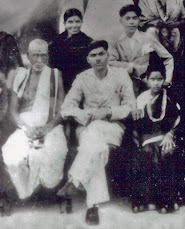Surya's views on the concept of mental health
The gist of Dr Surya’s views on mental health is contained in a series of six lectures, which he delivered at Mysore University in 1965 and again in 1967 (already referred to above).Here we find Surya, at his best - original, forthright and devastating in his sarcasm, about the current Western concepts on the subject. When he talks about Indian heritage, he knows his subject and he talks with conviction. However, what makes this paper as outstanding among dozens of similar papers from India is that rare insight with which the author has grasped the essence of what constitutes mental health according to Indian traditions. In a nutshell, Dr Surya makes two significant points in this paper. First, he refuses to accept the “average or statistical norm” as a basis for mental health. Instead, he suggested “ideal norm” as a basis for mental health. Secondly, he succeeds in offering a simple three-point definition of mental health, based on Indian cultural tradition. In my reading of psychiatric literature, over the years, I must have come across many definitions of mental health by different authors. I still find Dr Surya's definition as the simplest, most elegant and very Indian. But rather than me, let Surya speak for himself. Here are the three quotes from this paper:
”Each culture provides positive and negative cues and modes of reaction leading to integrative and creative behaviour in the culture. It also provides how positively and negatively to meet threatening changes. But, in all cultures, a majority of the people can only represent the negative or lower levels of behaviour -so to say, a vast majority become reflex victims of their own culture. Only a minority are the reflective, conscious representatives of the best in their culture, so to say the leadership. The codes are provided by the religion, philosophy, and such other structures.
”Moreover, some cultures are statistically oriented. That is to say, for them, a person is in good mental health, if he or she is like every other John or Jean in the neighbourhood of same status. But economic self-sufficiency, capacity to take pleasure in occasional gossip, moderate addiction to alcohol, god and morals, is one norm. Christ and Gandhi become abnormals, fit subjects for sarcastic humour or polite patronage. There is great fear of being different from your neighbour.
Other cultures are idealistically oriented. Mental Health, then, becomes an ideal goal to strive for and to achieve. Computer calculated averages of behaviour do not call for emulation. Striving towards the ideal, even at the risk of being different from the neighbour becomes praiseworthy even if unsuccessful.
”The Indian culture pays attention to the ideal norm of its culture and striving towards that ideal is considered by even the average person as an important component of sound mental health.”
Wednesday, July 15, 2009
THE PIONEERS OF INDIAN PSYCHIATRY-I DR. N.C.SURYA-The Lone Rider N.N.Wig-Part 7
Labels:
Sri Aurobindo,
The Mother











